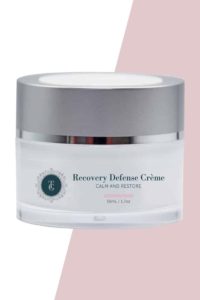Sensitive Skin or Underlying Inflammation?

Sensitive skin is a common condition and means your skin is more prone to reactions such as dryness, redness and itching. Most people who have sensitive skin notice occasional or frequent itching, burning and stinging of patches of skin. Sensitive skin is very treatable with suitable cosmetic products but for some may require a visit to the dermatologist. The term generally refers to skin that is more prone to inflammation. The cause of the inflammation may differ for each person.
Global studies have found that about 50% to 61% of women and 30% to 44% of men have experienced sensitive skin. One theory for why women are more prone to skin sensitivity is due to differences in skin thickness.
Women may also be more at risk for dehydration and dry skin due to hormonal changes, particularly as estrogen levels decline. They also tend to have reduced ceramide levels as they age, creating a potential for a more sensitive skin. The skin provides barrier protection for the body, but aging disrupts epidermal barrier function. Recent studies have shown that chronological aging alone produces important abnormalities in epidermal function that are revealed only when the skin barrier is disturbed.
Signs of sensitive skin come from the breakdown of your skin’s protective barrier. Sensitive skin is shown to have a decrease in ceramide levels. Together Essential fatty acids and Ceramides, combine to create a powerful protective barrier for the skin. They also are responsible for preventing transepidermal water loss from the skin, therefore helping to prevent dryness. This loss can be caused by the environmental factors, dehydration or aging, to mention a few. With age, your skin loses moisture and can become dry and cracked, putting you at risk for sensitive skin.
Sensitive Skin or Underlying Inflammation?
Most cases of what may be considered initially as sensitive skin can be easily treated, but it’s important to remember that skin irritation and particularly inflammation can sometimes be a sign of something more serious.
What is important to recognise is that, the skin, your body’s largest organ is simply a reflection of what is going on inside.
So having sensitive skin and being reactive to the elements and to ingredients in products etc is different from having redness and inflammation caused by an imbalance in your body that is expressed on your skin.

An imbalance can be caused by eating too many acidic foods. Check out some resources on how to balance acid and alkaline foods. Our body is naturally more alkaline. When it is too acidic it can trigger disorders that we really do not want to have to deal with.
Inflammation can have an emotional root or trigger. When we hang on to negative emotions or we cannot let go of grief, it can eventually trigger inflammatory conditions in the body. If mental health or healing is a concern always seek help before it manifests. When the mind and our emotions are balanced, in natural health we believe that the physical body will also balanced.
Other Considerations
Inflammation and/or sensitive skin can be caused by certain medications, especially ones that treat hypertension that can cause dehydration and thus dry, irritated skin. If you have ever received cancer treatment, you might have noticed patches of dry, itchy skin as a side effect. Diseases that affect your skin or blood can sometimes manifest as inflammation/ sensitive skin. If you have any concerns about a new patch of sensitive skin, reach out to your healthcare provider right away.
The following conditions may cause sensitive skin:
- Skin cancer
- Hodgkins lymphoma
- Kidney disease
- Liver disease
- Shingles
- Multiple sclerosis
- HIV and other autoimmune conditions
In any of these cases, The American Academy of Dermatology Association recommends seeking treatment for your sensitive skin so that it does not become worse. If you have been experiencing dry or irritated skin, you know how hard it is to not rub or scratch it. Long-term scratching can make the itchiness permanent and lead to skin infections. Long-term irritation and bleeding can come from scratching your irritated skin. If your sensitive skin bothers you at all, it’s always helpful to ask your healthcare provider for recommendations.
Sensitive Skin and/or Inflammation Top 10 things to look for
1. Your Skin Easily Flushes
Redness is a common sign of sensitive skin, whether the culprit is a genetic predisposition—like rosacea—or just a reaction to certain ingredients placed on the skin. Those with truly sensitive skin have this reaction often. Those with only infrequent skin “sensitivity” to harsh ingredients don’t meet the designation of sensitive skin but should avoid anything that routinely causes irritation. Check out our Collection For Sensitive Skin.

2. You’re Prone to Rashes and Bumps
Frequent rashes and tiny red bumps are telltale signs of sensitivity. Be sure to check any new products by performing a patch test on a small, inconspicuous area. Wait 24 hours to see if a rash develops before applying it to your entire face or body.
3. Beauty Products Sting or Burn
Whether it’s a cleanser, moisturizer, foundation or sunscreen, your skin reacts—and not in a good way. People with sensitive skin tend to have a thinner skin barrier, allowing the ingredients in skin care products to sting or burn. Don’t overload sensitive skin with harsh ingredients—stick with gentle products formulated for sensitive skin.
Build and strengthen your skin barrier with our products containing cold-pressed oils. DNA cream and Serum 45.

For more information read our article The Beauty Boosting Power of Oils
4. You Have Dry Patches
Dryness and irritation of the skin can be signs of eczema, a type of dermatitis characterized by a leaky skin barrier that doesn’t effectively trap moisture. Scaling and flaking tends to develop the longer the dryness persists. For mild eczema, over-the-counter creams can help but for more persistent flare-ups, a topical steroid can provide relief. Check out our Hyaluronic Collection designed for dry skin.

For more information read our article on Filaggrin and Eczema
5. Your Skin Feels Itchy
Itchy, taut skin is a symptom of sensitivity easily exacerbated by frequent washing with hot water. Switch to a lukewarm temperature, and be sure to use a gentle cleanser, followed by a ceramide-packed moisturizer.
6. You’re Sensitive to UV Rays
You step into the sun without a hat or sunscreen, and the next thing you know, you’re flushed and beet-red. Photosensitivity can cause a skin rash on the face, outer arms and chest. Wear a broad-spectrum sunscreen with SPF 30 or higher and avoid synthetic varieties—titanium dioxide and zinc oxide are more agreeable to sensitive skin.

7. You Have Broken Capillaries
Broken capillaries refer to tiny blood vessels that become visible near the surface of the skin and are often seen on the nose and cheeks. Those with sensitive skin—which is thin and has fewer protective layers—are more prone to having broken capillaries.
8. Fragrance and Your Skin Don’t Mix
It may smell good, but scented products are an extremely common trigger for those with sensitive skin. Look for fragrance-free beauty products, and don’t assume that “natural” scents will be okay. Typically, therapeutic essential oils—such as cinnamon, clove and peppermint—quickly inflame sensitive skin. No artificial fragrances in our products with essential oils appropriately chosen to not create a reaction.
9. Your Skin Reacts to Bad Weather
Cold, windy days are an immediate trigger for those with rosacea, causing flushing via agitated, swollen blood vessels. Inflamed skin needs calming, so look for products with soothing ingredients like calendula, chamomile and azulene extract.
10. You Break Out Easily
Cold, windy days are an immediate trigger for those with rosacea, causing flushing via agitated, swollen blood vessels. Inflamed skin needs calming, so look for products with soothing ingredients like calendula, chamomile and azulene extract.

Check out our Exfoliators designed for Sensitive skin
Solutions: Ingredients to avoid
If you have sensitive skin, avoid products containing:
- Antibacterial or deodorant ingredients
- Alcohol
- Retinoids or alpha-hydroxy acids
- Benzoyl peroxide
Solutions: Ingredients to include
Oatmeal
Some of the oldest treatments could also be the best. Your grandmother may have touted oatmeal baths as the secret to soothing sensitive skin, and the research agrees with her. A 2016 study found that lotions that contain colloidal oatmeal provide clinical improvements in skin dryness and irritation. Using oatmeal lotion can also protect your skin’s barrier, making it less likely to react to environmental irritants such as perfumes or dyes in clothing.7
Panthenol
Panthenol is best known for its ability to act as a moisturising ingredient — which attracts and retains moisture in skin. As a moisturising ingredient, Provitamin B5 stabilises the skin’s barrier function, reducing the amount of water lost through the skin. This, in turn, improves skin texture and elasticity, making Panthenol ideal for treating dry, flaking or coarse skin.
In addition to its moisture retaining and softening properties, Panthenol also helps skin to defend itself against external stresses. When applied, Panthenol reduces itching, redness and suppresses inflammation. Thanks to its soothing and repairing properties, Panthenol also helps relieve inflamed acne and skin that has recently undergone clinical treatment, such as chemical peeling. Even eczema is relieved and sunburned skin benefits from products with Panthenol.
Hyaluronic Acid
The best part about hyaluronic acid is that it holds 1,000 times its weight in water which is why it has the incredible ability to draw moisture into your skin. By using it daily, your skin will feel more hydrated, supple and rejuvenated Since hyaluronic acid is a substance naturally produced by your body, you’ll find that even the most sensitive skin can tolerate hyaluronic acid. It’s super gentle on the skin, so don’t be fooled by the fact that it’s classified as an “acid.”
Ceramides
Although the skin naturally makes ceramides, environmental factors like cold weather, air pollution, the sun’s UV rays, and low humidity along with stress and aging can reduce their concentration or effectiveness, making skin feel dry. Low levels of ceramides allow moisture to escape the skin, letting in irritants, air pollution, and even infectious agents.
When things like irritants enter the skin, the “immune system can ‘see’ them and develop a contact irritation or skin allergy. That can lead to dry, rough, flaky, and inflamed skin, especially in people with active eczema.Instead of adding moisture to your skin, all types of ceramides prevent moisture loss by reinforcing your skin’s barrier function.
Ceramides act as the ‘grout’ between the ’tile-like’ upper (skin) cells to create a tight seal to hold in hydration
~ Dr. Shainhouse

Written By Trish Green DiHom(Pract) B.Ed Cidesco Diplomat. Bach Flower Therapist.
Trish is a graduate of the Victoria University of Manchester, Trish is a teacher with 35 years of experience in the education field. For twenty of those years she has been an educator in the esthetics industry. She is an advocate for raising standards in education for Complementary Health Care Practitioners with special interest in Aromatherapy. Her career in the field of natural health and esthetics is wide and varied. From Doctor of Homeopathy to Cidesco diplomat, Trish is a dedicated professional, committed to ongoing education and the education of others.


